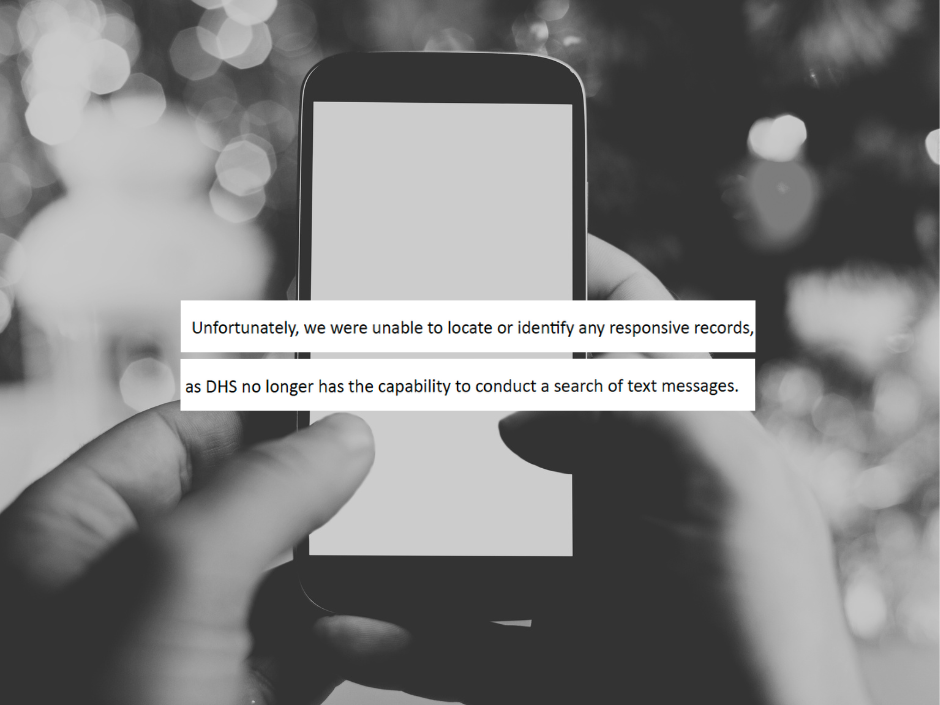
DHS’s Text Message Preservation Policy
What we know, and what key information we’re still missing.

The Department of Homeland Security (DHS) is central to the Trump administration’s most controversial and far-reaching actions, including mass deportations and the federal occupation of American cities.
To understand how the agency is operating and who is making decisions behind closed doors, American Oversight filed Freedom of Information Act (FOIA) requests and a lawsuit seeking records that include Secretary Kristi Noem and other senior officials’ text messages.
Why this matters
DHS plays a central role in the Trump administration’s agenda, including mass detention and deportation operations. The agency’s size and power is only growing: Trump’s budget law, the so-called “Big Beautiful Budget Act,” allocated $75 billion to ICE for immigration enforcement and detention.
DHS is also connected to the military occupation of American cities. In June 2025, President Donald Trump ordered 4,000 National Guard troops and 700 Marines to Los Angeles over the objections of California Governor Gavin Newsom and Mayor Karen Bass. This was the first time a president has activated a state’s National Guard without the request of a governor since 1965. This deployment is intertwined with DHS’ immigration enforcement: The administration claimed the troops were necessary to protect Immigration and Customs Enforcement (ICE) agents.
By November 2025, the Trump administration deployed federal troops to Washington, D.C., Memphis, Charlotte, Raleigh, Chicago, and Portland, and he’s discussed deployments in several more cities. Typically, these deployments coincide with immigration crackdowns conducted by DHS and ICE.
Given its increase in budget and power, it is important that Americans understand how DHS is making its decisions and carrying out its actions, so that they can hold the agency accountable. Public records requests can reveal what is happening behind the scenes, and for DHS, text messages are a particularly important part of those records. Before her time as Secretary of Homeland Security, Noem reportedly earned the nickname “Governor Text Message” for her prolific use of text messaging to conduct official business.
Even though a significant amount of DHS business is likely conducted through text messages, DHS’s text message preservation policies have been unclear. To date, despite numerous FOIA requests and two lawsuits, we have not received records of Noem’s texts during controversial events.
What we’re doing about it
We started with FOIA requests.
We sent FOIA requests to DHS and ICE for communications regarding the LA deployment, including for text, Signal, and email communications from Noem and other top DHS officials.
On July 23, DHS responded to our FOIA request, claiming that “text message data generated after April 9, 2025, is no longer maintained.” We submitted a follow-up FOIA request in August seeking DHS leaders’ July text messages. Just two and a half hours later, DHS told us that it “no longer has the capability to conduct a search of text messages.”
The possibility that Noem could be making decisions and sending orders over text without maintaining any records was so alarming that the New York Times published a story on it.
So we wrote demand letters, filed more FOIAs, and sued.
In August, we sent letters demanding that DHS take urgent action to preserve and recover any lost or destroyed records. We also asked the agency to tell the National Archives and Records Administration it had failed to preserve records as required by the Federal Records Act. In a separate letter to Acting Archivist Marco Rubio, we asked the National Archives to prevent any more records from being destroyed and to work with the Attorney General to recover the missing records.
We also filed more FOIAs to further investigate DHS’s records retention policies. We requested:
- Noem and senior officials’ August texts
- Communications discussing text message preservation and the use of Signal, a messaging platform with auto-delete capabilities
- Internal DHS policies outlining procedures for preserving and searching text message records
And we filed two lawsuits. In October, we sued DHS, Noem, and Rubio over the apparent failure to preserve texts, asserting that this violates the Federal Records Act (FRA), which requires federal employees to preserve records of official business. We also filed a motion for a preservation order and preliminary injunction to preserve or recover these records while the case proceeds, and to require the agency to develop policies to ensure texts are preserved in the future.
Later that month, we sued DHS and the Federal Emergency Management Agency (FEMA) for failing to release the same text messages as well as communications related to some of the Trump administration’s most controversial actions. In other words, this lawsuit says the administration violated the Freedom of Information Act by not turning over records in response to our requests, including about military strikes and National Guard deployments in American cities, inhumane immigration enforcement, and the upheaval of government operations under the Department of Government Efficiency (DOGE).
In response, DHS admitted it gave us “erroneous information” and DHS has ordered top officials to preserve texts. We’re still waiting on the records we requested.
DHS responded to our FRA lawsuit by saying its previous statements were incorrect and that texts were being preserved after all. We revealed the government’s new assertion in court in November, in a joint status report. The report included declarations from DHS, which claimed its earlier responses to our FOIAs were “erroneous.”
DHS also said it disabled its text-archiving system in April 2025 and now relies on individual officers to manually capture and forward their own messages — a process that federal law says must be completed within 20 days. Relying on officials to turn over their own messages increases the risk that DHS officials won’t comply and vital records will disappear.
In a second joint status report, also filed in November, we revealed that DHS issued a notice demanding that top DHS officials “preserve documents and electronic records that relate to the subject matter of the complaint in this case” as part of our litigation. The Trump administration also told us that it archived and searched most of these officials’ electronic devices, but it was still unable to confirm that these officials preserved all records responsive to our FOIA requests. The government agreed to provide us with its forthcoming response to the National Archives and Records Administration’s September letter, which directed DHS to investigate and explain how its record-retection policies for texts comply with the FRA.
To date, DHS has not released the records that would prove that they were preserved, as federal law requires.


